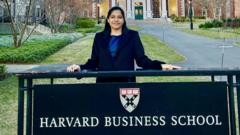In 2023, Shreya Mishra Reddy fulfilled a dream by being admitted to Harvard University, a prestigious institution revered in her home country of India. However, she now faces a daunting reality as she informs her family that she might not graduate in July due to the Trump administration's decision to halt international student enrollments at Harvard, accusing the university of non-compliance with legal directives.
Ms. Reddy, along with approximately 6,800 international students who constitute more than 27% of Harvard’s enrollment, is at the center of this tumultuous situation. The recent policy shift not only disrupts her educational aspirations but also catalyzes concerns for future international students, the majority of whom hail from countries like China and India.
Harvard has denounced the government's actions and has indicated a willingness to challenge the decision legally. This predicament has fostered an atmosphere of apprehension as current students navigate an uncertain future, with the possibility of being required to transfer to other institutions to maintain their student visas. “I hope Harvard will stand for us,” Ms. Reddy expressed, reflected in the sentiments echoed by others caught in this administrative quagmire.
This crackdown on international students is part of a broader pattern under the Trump administration, targeting educational institutions that participated in or were associated with significant pro-Palestinian activism on campus. Notably, the administration threatened to implement a ban on foreign students as early as April due to Harvard's refusal to change its hiring and admission policies, which was perceived to align with external political influences.
The response from the affected students has been one of shock and anxiety. Kat Xie, a Chinese student enrolled in a STEM program, lamented the hit to her optimism when news broke regarding the government’s stance. The financial and logistical burdens associated with transferring schools compound these students’ fears, particularly amid soaring educational costs.
“None of this is what we've signed up for,” lamented Abdullah Shahid Sial from Pakistan, one of the few Pakistani students to receive admission in 2023. This sentiment captures the broader disillusionment among foreign students who once viewed the U.S. as a land of opportunity but now feel unwelcome. Many have aspirations tied to their visas, and unforeseen policy changes leave their futures hanging in the balance.
Amidst the confusion, some students are reconsidering travel plans, wary of re-entering the U.S. after summer breaks due to fears surrounding visa renewals and eligibility. The added stress of end-of-term responsibilities, such as securing housing and maintaining community ties, intensifies the plight of students like Jiang Fangzhou from New Zealand, who contemplates the implications of the ban on future students who had counted on Harvard.
In a political context, this situation underscores significant concerns over the treatment of international scholars and the potential fallout for the United States' image as a destination for global students. The administration's approach to U.S. higher education is raising alarm among students and educational leaders alike, prompting calls for a reevaluation of policies that could further alienate the international academic community.



















